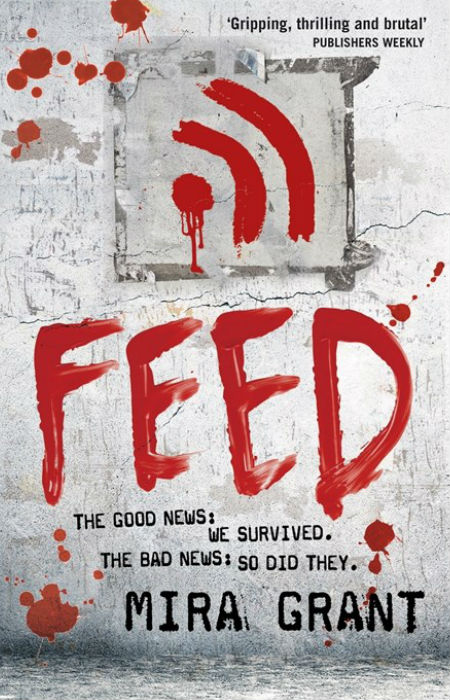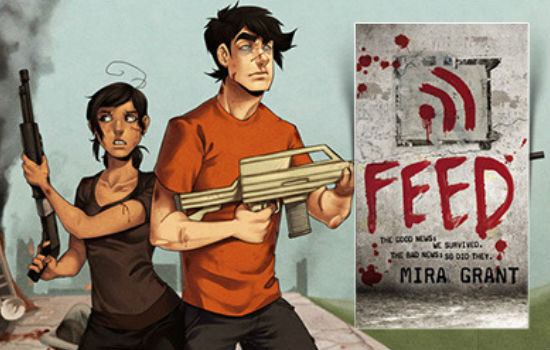
It is generally agreed that being in the middle of a zombie apocalypse is something you should avoid at all costs, what with the end of civilisation, degradation of humanity and threat of imminent death.
But what if the apocalypse came and went, and left society mostly functioning, compromised, diminished in numbers and awash in fear but otherwise extant? What do you do then?
If you’re like the majority of people in near-future USA (around 2040), who survived The Rising of 2014-2016 and came out the other side alive, you have retreated to your fortified home, interacting with the world outside through cyberspace, reluctant to attend outside gatherings, commune with nature or meet anyone you don’t know.
However, if you are like Georgia (“George”) and her brother Shaun, adopted into the celebrity blogger Mason family where they are treated more like assets than children, who have found impending fame and fortune through their willingness to go into the outside world and report on it, you make your accommodation with a less than ideal reality and do what you can with it.
“Fear makes people stupid, and Kellis-Amberlee has had people scared for the last twenty years. There comes a point where you need to get over the fear and get on with your life, and a lot of people don’t seem to be capable of that anymore. From blood tests to gated communities, we have embraced the cult of fear, and now we don’t seem to know how to put it back where it belongs.” (P. 186)
Which in their case, in a world which Mira Grant (pseudonym for Seanan McGuire) brings to life vividly and effortlessly in such a rich and detailed way that you feel as if you’re living in it along with the Mason siblings, is reporting on society as they see it, one all too aware that the apocalypse hasn’t so much stopped as gone into slow-motion, whirring back to life (or undeath) at the least provocation.
As much an exhumation and examination of the current political and social reality in America, riven by extremist views and violent polarisation, Feed, the first of a trilogy, is also a thriller, one which adopts the take-no-prisoners approach to core character deaths as Game of Thrones or The Walking Dead.
Which is, when you think about the ever-present danger of a world where zombies are not gone, just tucked out of view – all of Alaska for instance which is now given over solely to the undead – and the Kellis-Amberlee virus, released aerially in 2014 is in everyone’s bloodstream, awaiting its gruesome moment, exactly the approach you should take.
After all, the USA, indeed the world, is no longer a safe place in any way, shape or form, bedevilled by the undead and those very much alive who have seized upon the new dystopian reality to violently push their own suspect agendas, putting many of their fellow citizens at risk every time they make a move.
The richness of this thrilling, edge-of-your-seat novel is that it spends as much time pushing the action along as it does building the characters, an incredibly detailed worldview and exposition, which never ever slows down the perfectly-weighted, nuanced and utterly-compelling narrative.
If you have ever thought that everything that could be said about the zombie apocalypse and its aftermath has been said – for further proof this isn’t the case see The Girl With All the Gifts and The Boy on the Bridge – then reading Feed will disabuse you, and profoundly so, of that notion.
Grant spends a great deal of time, directly and indirectly, examining what a post-apocalyptic world might look like; in her USA, bloggers rule, the successors to traditional media since they called the apocalypse for what it was early on, saving countless millions of lives, hyper-security is everywhere, and everyone has retreated, save for Georgia, Shaun and their ilk to their bunkers, the better to stay alive.
The effect this has on society is considerable, and Grant unsparingly documents it, painting us a picture of a society where fear has warped everything from social interactions to commerce to the political process; this may be 2040 but if you look hard enough, it’s not that different from the present day (zombies excepted).
“I nodded grudgingly. Under the strict interpretation of the law, the CDC would have been within its rights to come into the valley, shoot us, sterilize the surrounding area, and deal with our remains. The fact that it took us alive for extensive testing was unusual, because it represented an unnecessary risk on its part–no one would have questioned if the CDC had killed us.” (P. 400)
As she makes abundantly clear, you can either acquiesce to the fear or fight it, and Georgia and Shaun – she is a newswomen or “Newsie”, he is an adventurer or “Irwin” – decide the latter is the only option, placing them in the firing line not just of the undead but of a vast conspiracy that Feed just begins to unpack as it ends.
Having a target fixed firmly on them is both an adrenaline rush and an unnerving reminded that theirs is not a safe world, and that fighting back carries considerable risks, costs so great in fact that you need to seriously ask yourself if it’s worth it.
For Georgia and Shaun, closer than close thanks to their upbringing – it’s their friendly sparring bond that provides so much of the book’s expansive emotional resonance – there is only answer to that question, and as they seek to find out what is going on behind the scenes of modern America courtesy of their press membership of US Presidential hopeful Senator Peter Ryman’s campaign, they have to confront the realness of what they have undertaken to do again and again.
It’s gripping, funny at times – their colleague Buffy is a joy, a friend as much as a catalyst for some serious narrative momentum well into the book – and engaging in so comprehensive a way that it’s near-impossible to pull yourself away.
This is the zombie apocalypse with a great big harrowing dose of reality thrown in, a cautionary, compelling tale of what can happen when society falls in on itself, by whatever means, and people need to decide which side of history they are on.
